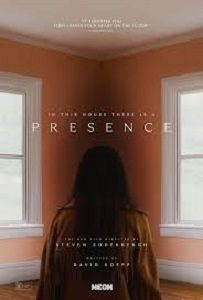Presence Movie Review: A Chilling Thriller That Lingers After the Credits.Moviesgod

Presence Movie Review: A Haunting Experience That Feels Personal
Breaking the Mold of the Supernatural Thriller
We’re in an age where filmmakers are pushing creative boundaries, not just with stories, but with how those stories are told. In Presence, director Steven Soderbergh takes what could have been a typical supernatural thriller and transforms it into something bold, unique, and deeply immersive. Shot entirely in long takes and from a first-person point of view, this film doesn’t just ask you to watch—it asks you to be there. While that approach may not work for everyone, it’s a risk that pays off in surprising ways.
The story follows the Payne family as they move into a new home, only to find themselves surrounded by unexplained and unsettling events. But instead of loud scares and dramatic horror tropes, the film leans into psychological discomfort, personal tension, and emotional honesty. It’s not the kind of thriller that jolts you—it’s the kind that slowly crawls under your skin and lingers.
A New Way of Seeing—and Feeling
One of the most striking things about Presence is its visual style. Unlike traditional films, or even most found-footage thrillers, the entire movie is told through a mysterious first-person perspective. We never find out exactly whose “eyes” we’re looking through, and that mystery becomes part of the story itself.
This technique creates a strange intimacy. The camera doesn’t try to flatter the actors—it captures them as they are, raw and unfiltered. Emotions feel closer. Reactions feel more real. And because the point of view never breaks, we begin to feel like a silent participant in the family’s life.
Soderbergh uses this style not just as a gimmick, but as a way to connect us to the characters. Instead of being outsiders watching events unfold, we’re placed inside the story. We see the family members at their best and their worst, which makes their personal journeys feel more real and relatable.
Real Characters, Real Tension
What gives Presence its emotional weight is the strong character writing by David Koepp, paired with a talented cast who fully commit to the roles. At the heart of the story is Chloe, played by Callina Liang. She’s a teenage girl finding her voice in a family full of complex dynamics. Chloe’s path toward self-assurance is subtle but powerful, and Liang delivers it with quiet strength.
Her father Chris (Chris Sullivan) is warm and understanding—the emotional glue of the family. Her mother Rebekah (Lucy Liu) is a sharp contrast: ambitious, tough, and morally grey. This reversal of traditional family roles is one of the film’s most refreshing choices. Instead of falling into the usual clichés, the characters feel layered and real. Lucy Liu, in particular, stands out with a strong, nuanced performance as a mother who’s not easy to like—but impossible to ignore.
We also meet Tyler (Eddie Maday), Chloe’s older brother, whose tough exterior hides uncertainty. And then there’s Ryan (West Mulholland), a friend of Tyler’s who becomes a surprising and chilling presence in the story. At first, Ryan seems like just another teenager. But as the film goes on, layers peel back to reveal something much darker. It’s through his interactions that we begin to sense the film’s deeper themes coming into focus.
Slow-Burn Horror with Something to Say
If you walk into Presence expecting loud jump scares, big horror set pieces, or a comforting happy ending—you’ll be surprised. This isn’t a rollercoaster kind of horror movie. It’s a quiet, unsettling, slow-burn experience that chooses emotion over spectacle. And in doing so, it becomes far more memorable.
The scares in Presence are psychological. They come from the feeling of being watched, the weight of unspoken tension, and the discomfort of not knowing who to trust. There’s something deeply human about the fear it explores—especially the dangers that teenage girls like Chloe often face in the real world. In that way, the horror isn’t just supernatural. It’s grounded, relatable, and painfully real.
The film also takes its time to explore family dynamics in a thoughtful way. Despite the emotional distance and conflict, there’s a strong sense that things can change, that healing is possible. That hopeful undercurrent adds warmth to a story that could have easily been just dark and cold.
More Than a Movie—An Experience That Sticks With You
At just under 90 minutes, Presence is short but deeply affecting. It’s a film that demands your full attention—not just because of its unique camera work, but because every look, pause, and word carries meaning. You can’t half-watch this film. But if you give yourself over to it, you’ll find something truly rewarding.
After the film ends, it doesn’t feel like something you just watched—it feels like something you went through. The questions linger. The emotions stick. And the memory of the experience stays with you longer than most big-budget thrillers ever could.
Soderbergh and Koepp don’t just tell a story—they invite us to be part of it. And even if it’s uncomfortable at times, even if it’s slow or quiet or ambiguous, it’s also honest, human, and full of heart.
Leave a Reply